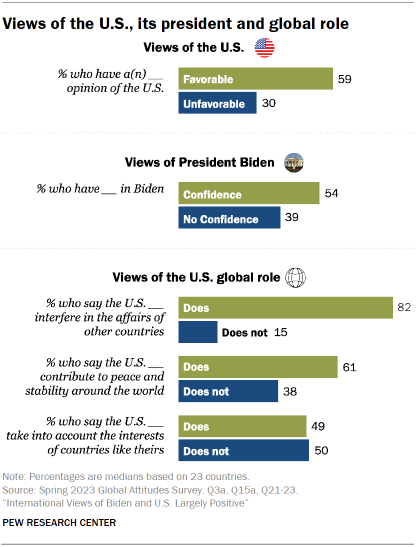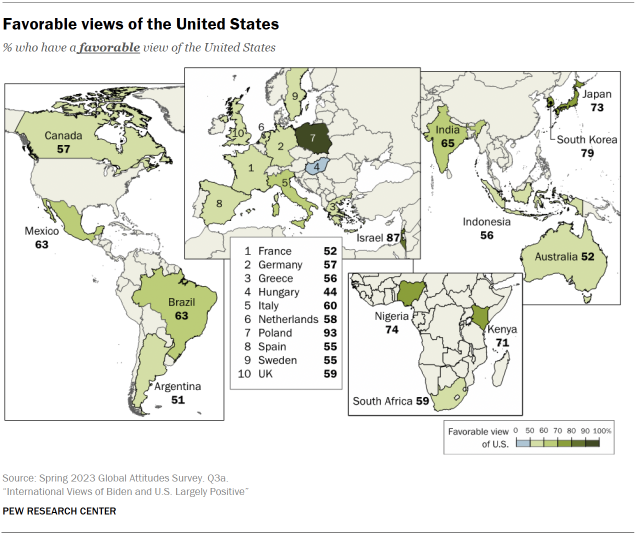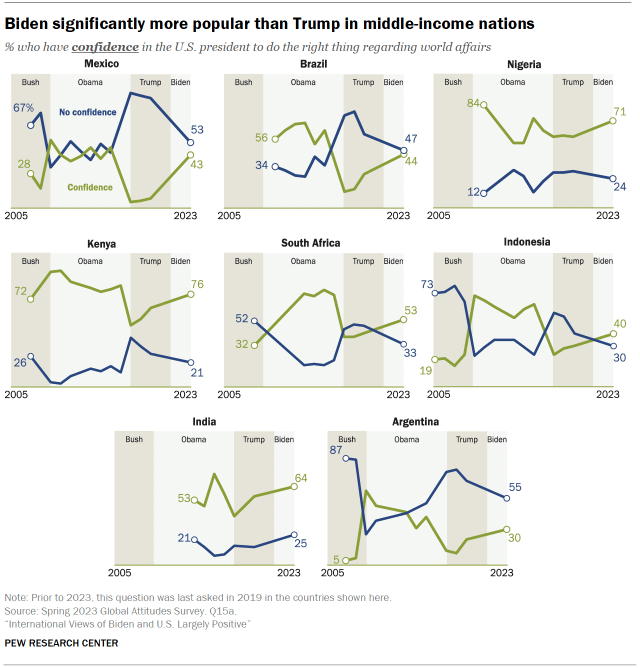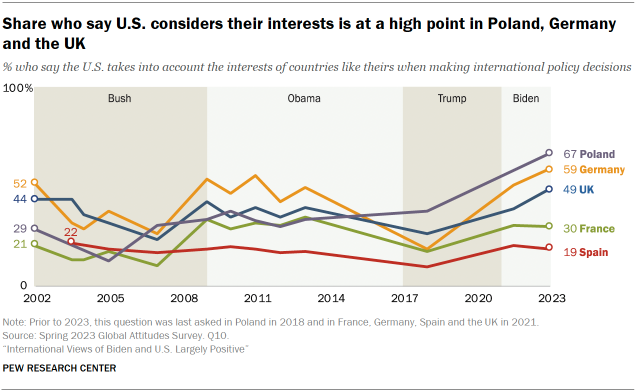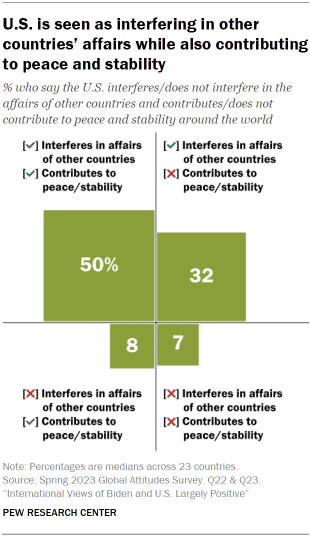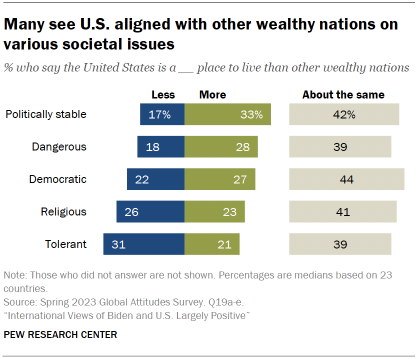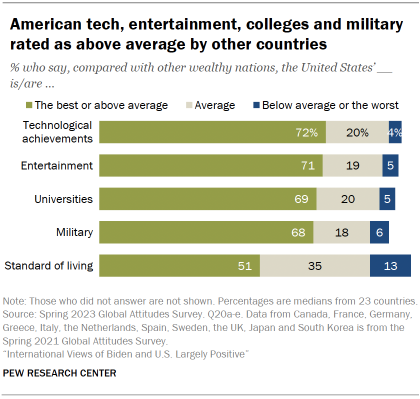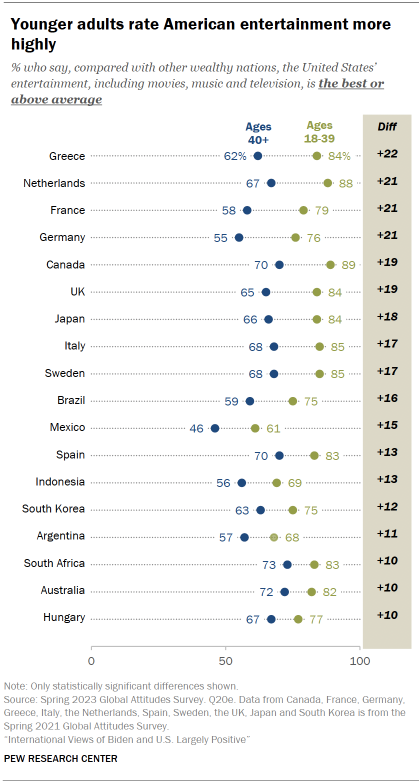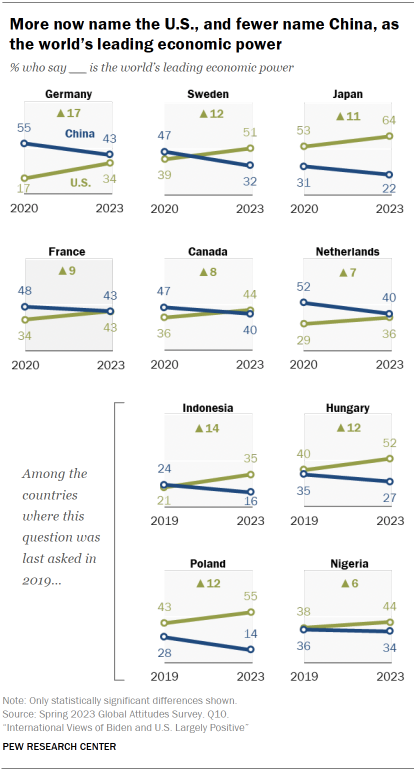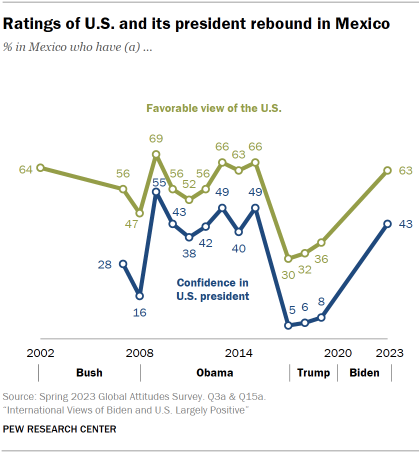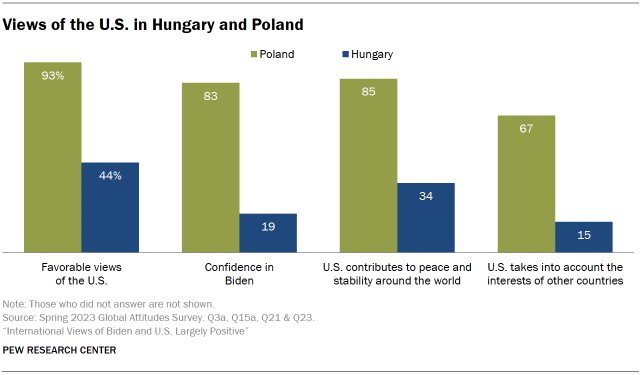Views of the U.S. are much more positive than negative across the countries we surveyed. A 23-nation median of 59% have a favorable view of the U.S., while only 30% have an unfavorable view.
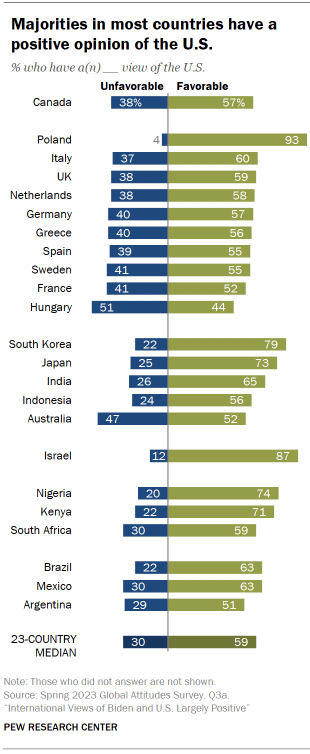
Opinion of the U.S. is especially positive in Poland and Israel, where the shares who rate the U.S. favorably are the highest they have been since we first started surveying in those countries. Poland’s views of the U.S. improved dramatically last year after the start of the war in Ukraine and remain high this year.
Hungary is the only country surveyed this year where views of the U.S. are on balance negative: 51% of Hungarians have an unfavorable opinion of the U.S., compared with 44% who have a positive opinion. Hungary is also the only country where assessments of the U.S. are at a record low.
In many other countries that have data from both 2022 and 2023, views of the U.S. have stayed relatively consistent since last year, though ratings have dropped somewhat in Germany, Canada, South Korea and Sweden.
In countries where we have not surveyed since 2019, views of the U.S. have improved. In general, they follow the same pattern as we saw in our 2021 survey: Many countries gave the U.S. record low ratings during former president Donald Trump’s administration and the start of the coronavirus pandemic, then saw a marked improvement after Biden took office. For example, 63% of Mexicans now rate the U.S. positively, compared with a low of 30% in 2017, Trump’s first year as president.
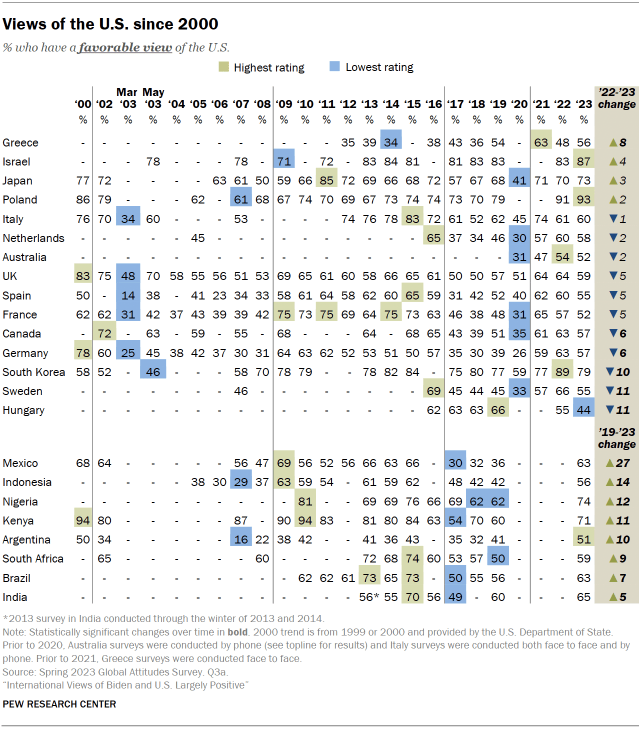
In 17 countries, including Canada, Australia, South Korea, Israel and nations in Europe and Latin America, we asked people to place themselves on an ideological scale ranging from left to right. People on the political right generally have more positive views of the U.S. than those on the political left. The exception, again, is Hungary: Hungarians on the right of the political spectrum – particularly those who have a favorable view of the ruling Fidesz party – are less likely to view the U.S. positively.
2. Confidence in Biden to handle world affairs
On balance, Biden gets positive reviews on the survey, although there are notable differences across countries. A median of 54% say they trust Biden to do the right thing in international affairs and 39% say they do not.
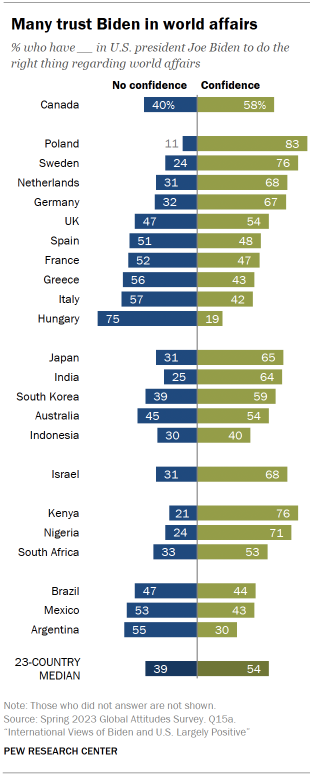
As with views of the U.S., Poland and Hungary stand out for their stark disagreement about the U.S. president, representing the highest and lowest ratings in the survey, respectively. More than eight-in-ten Poles have confidence in Biden when it comes to international affairs. Just 19% of Hungarians agree. And while the share who have confidence in the U.S. president is at an all-time high in Poland, it is at a record low in Hungary, dropping 12 percentage points since 2022.
Hungary is not the only NATO ally with limited trust in Biden. Roughly half or more in Spain, France, Greece and Italy – all NATO member states – say they do not have confidence in Biden to do the right thing regarding world affairs.
Ratings of Biden have not changed much since last year in most of the other countries surveyed, with a few exceptions. Israelis offer a somewhat more positive rating of the U.S. president now compared with 2022. But fewer people in France and South Korea trust Biden now compared with the previous year.
In the countries that we have not surveyed since 2019, this is the first measure of confidence in Biden as the president. In each country, current ratings for Biden are higher than those for Trump, but lower than their peak during Obama’s presidency.
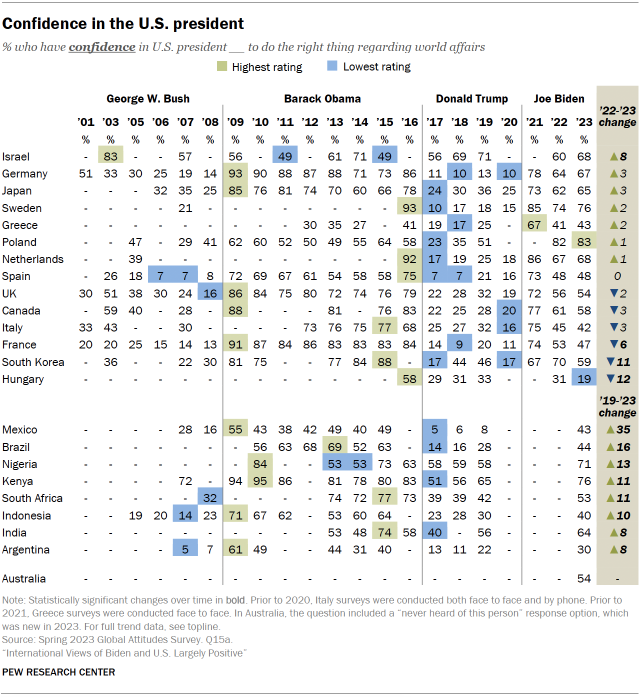
In Mexico, for example, ratings of the U.S. president were highest in the first year of Obama’s presidency, when 55% of Mexicans had confidence in him. But ratings plummeted to a record low of only 5% when Trump took office. Now, 43% of Mexicans have confidence in Biden: Fewer than half, but a much larger share than during Trump’s presidency.
This overall pattern matches the data we see in many other countries we survey. Notably, confidence in Biden in world affairs decreased in many places after his first year in office, but remains higher than Trump’s highest confidence rating in every country except Hungary and Israel.
Adults ages 40 and older have more confidence in Biden’s handling of world affairs than adults under 40 in Germany, Greece, Canada, Sweden, France, the Netherlands, Australia, Japan and South Korea.
3. The United States’ role in world affairs
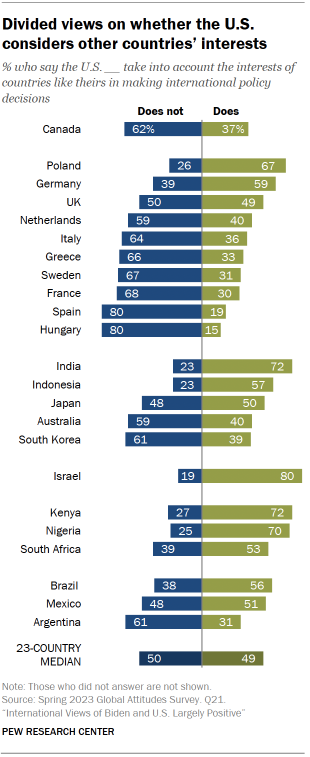
To assess how people perceive America’s role on the world stage, we asked respondents to what extent they feel the U.S.:
- Considers the interests of countries like theirs when making international policy decisions;
- Interferes in other countries’ affairs; and
- Contributes to peace and stability around the world.
Does the U.S. consider other countries’ interests?
A median of 50% across the 23 countries surveyed say the U.S. does not take their country’s interests into account in making international policy decisions, while a median of 49% say the U.S. does take interests into account at least a fair amount.
Majorities in 11 countries say the U.S. does not take their interests into account, and this sentiment is particularly strong in Europe. For example, eight-in-ten of those in Hungary and Spain say the U.S. does not consider their interests, and roughly seven-in-ten in France and Sweden say the same.
In Japan, Mexico and the UK, views are split: Roughly half say the U.S. takes their interests into account and nearly equal shares say it does not.
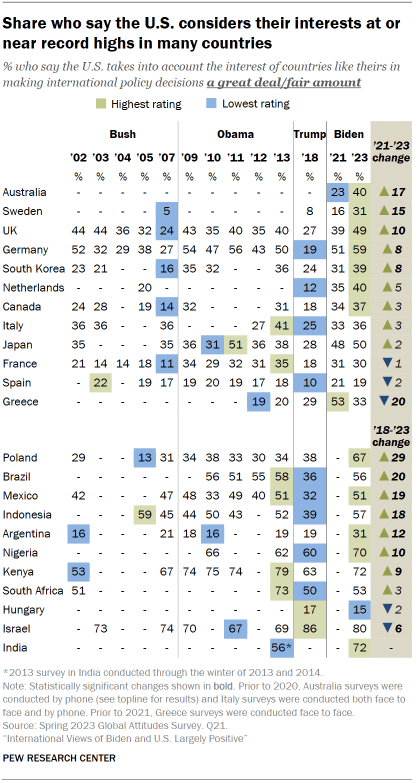
Majorities in eight countries – Israel, India, Kenya, Nigeria, Poland, Germany, Indonesia and Brazil – believe the U.S. does take their interests into account when making international policy decisions. Israel, where the highest share holds very favorable views of the U.S. (51%), stands out on this measure: 80% say the U.S. considers their interests, although this is down 6 percentage points from 2018.
In many countries, the share who say the U.S. considers their interests on policy decisions at least a fair amount has increased significantly since the question was last asked. Shifts are particularly large in countries where this question was last asked in 2018, during Trump’s presidency. For instance, 38% of Poles surveyed in 2018 said the U.S. took their interests into account; this year, two-thirds say the same.
Significant increases from 2018 are also found in Brazil, Mexico, Indonesia, Argentina, Nigeria and Kenya.
There have also been significant increases in several countries where this question was last asked in 2021, including Australia, Sweden, the UK, Germany and South Korea.
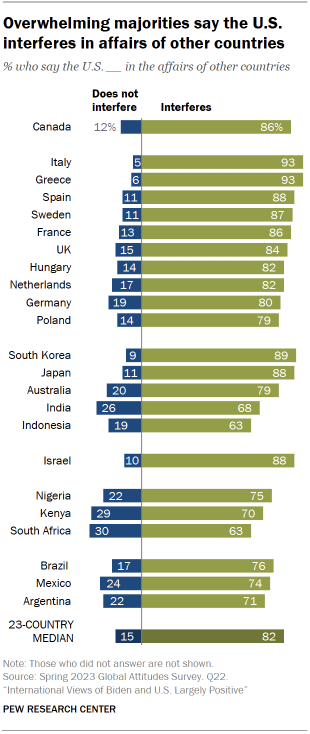
Greeks, however, have grown more pessimistic on this measure. One-third say the U.S. takes their interests into account, down 20 percentage points from the 53% who said the same in 2021.
Does the U.S. interfere in other countries?
A median of 82% across all countries surveyed say the U.S. interferes a great deal or a fair amount in the affairs of other nations, while 15% say it does not interfere much or at all. Majorities agree with this sentiment in every country surveyed, including about nine-in-ten or more in Italy, Greece, South Korea, Israel, Japan, Spain and Sweden.
In six countries – including five European nations – half or more believe the U.S. interferes a great deal.
No more than 30% in any country surveyed say the U.S. does not interfere much or at all. The highest share says this in South Africa. About a quarter or more in Kenya, India, Mexico, Argentina and Nigeria believe the U.S. does not interfere much or at all.
In 16 countries, men are more likely than women to say the U.S. interferes in the affairs of other countries a great deal. For example, 46% of men hold this opinion in the Netherlands, compared with 27% of women.
Does the U.S. contribute to peace and stability?
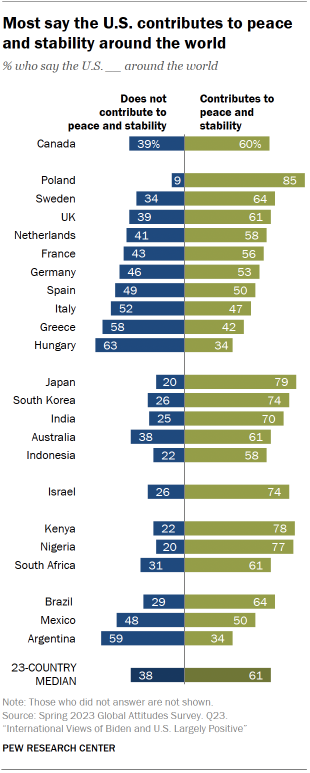
Across the 23 countries surveyed, a median of 61% say the U.S. contributes to peace and stability around the world, compared with 38% who say it does not.
Majorities in 16 countries say the U.S. contributes to world peace at least a fair amount, including 85% in Poland.
However, the sense that the U.S. does not contribute to peace and stability is more widespread in Europe compared with other regions, and about six-in-ten express this opinion in Hungary and Greece.
In most of the other countries surveyed, solid majorities say the U.S. does contribute to peace and stability. Argentines and Mexicans are exceptions: 59% in Argentina say the U.S. does not contribute these things to the world, while opinion in Mexico is mixed.
In Canada, Australia and several European countries, adults ages 40 and older are more likely than those ages 18 to 39 to say the U.S. contributes to world peace and stability. In Sweden, for example, those 40 and older are 23 percentage points more likely to say the U.S. contributes to peace than those ages 18 to 39.
However, in India, South Korea and Brazil, the opposite pattern is present: Younger people are more likely than their older counterparts to say the U.S. contributes to peace and stability.
4. Views of American soft power
Many people in 23 countries around the world view American technological achievements, entertainment, universities and military as the best in the world or above average among wealthy nations. Yet, people generally see the U.S. as similar to other wealthy nations on five societal measures tested in the survey: political stability, safety, democracy, religiosity and tolerance.
Even though roughly four-in-ten say the U.S. is about as politically stable as other wealthy countries, one-in-three see the U.S. as more politically stable, while a median of just 17% believe the U.S. is less politically stable.
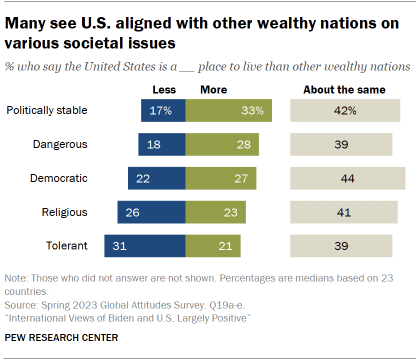
A similar pattern is present on the question of safety. A median of 39% think the U.S. is about as dangerous as comparable nations. However, a larger share says it is more dangerous than says it is less dangerous.
Many believe the U.S. aligns with other countries on democracy: A median of 44% say the U.S. is about as democratic as others, 27% believe it is more democratic and 22% believe it is less democratic. Roughly four-in-ten (41%) say the U.S. is about as religious as other wealthy countries, while 23% say the U.S. is more religious and 26% believe it is less religious.
A median of just under four-in-ten believe the U.S. is about as tolerant as other affluent nations, but a median of 31% say the country is less tolerant rather than more tolerant (21%).
How politically stable is the U.S.?
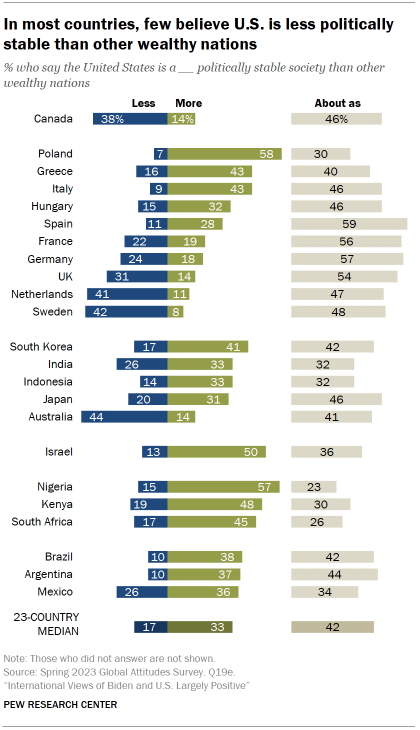
While the most common view is that the U.S. is about as politically stable as other wealthy nations, among those who think American political stability differs from the norm, large shares believe the U.S. is more politically stable than other prosperous countries. About half or more hold this view in Poland, Nigeria, Israel and Kenya.
Europeans hold mixed views on this issue. The share who say the U.S. is more stable ranges from just 8% in Sweden to 58% in Poland (the highest share to express this view in the survey).
Opinion in the Asia-Pacific region is also somewhat mixed. About four-in-ten in South Korea say the U.S. is more politically stable, as do about a third in India, Indonesia and Japan. Yet 44% of Australians believe the U.S. is less stable than similar countries. About four-in-ten say the U.S. is lessstable in Canada, the Netherlands and Sweden as well.
In some nations, people who place themselves on the ideological left are more likely than those on the ideological right to say the U.S. is less stable politically than other wealthy countries. For instance, 59% of Swedes on the left express this view, compared with 37% on the right. This pattern is also present in Australia, the UK, Canada, France, the Netherlands, Spain and South Korea.
How dangerous is the U.S.?
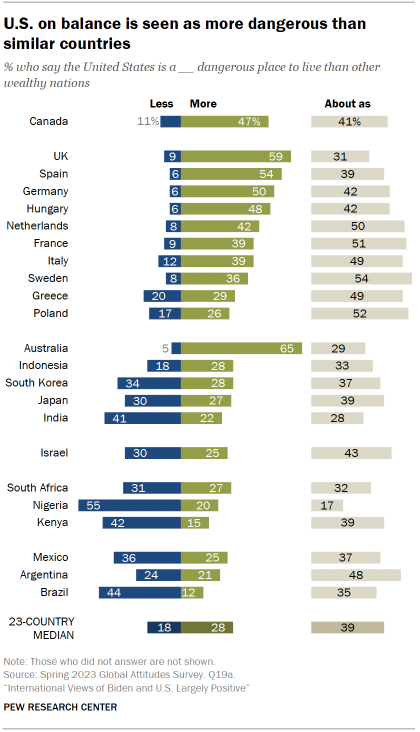
While a median of 39% say the U.S. is about as dangerous a place to live as other wealthy countries, those who believe differently are inclined to say it is more dangerous. For example, 47% of Canadians think the U.S. is a more dangerous place than comparable countries, while 11% say it is less dangerous.
Europeans are especially likely to believe the U.S. is unsafe. About half or more say the U.S. is more dangerous in Germany, Hungary, Spain and the UK.
A large majority – 65% – of Australians say the U.S. is more dangerous, while just 5% say it is less dangerous.
However, views are somewhat more mixed in the other Asia-Pacific nations surveyed. About a third in South Korea and 41% in India believe the U.S. is a less dangerous place.
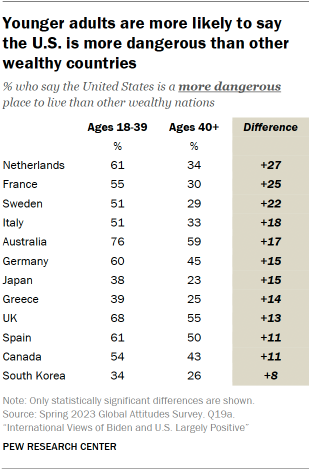
Nigerians are particularly likely to say the U.S. is a less dangerous place to live than other wealthy nations.
In some nations, adults ages 18 to 39 are especially likely to say the U.S. is a more dangerous place to live than other wealthy nations. This is particularly the case in Europe. For example, 61% of younger people in the Netherlands say the U.S. is more dangerous, while just 34% of older people agree.
How democratic is the U.S.?
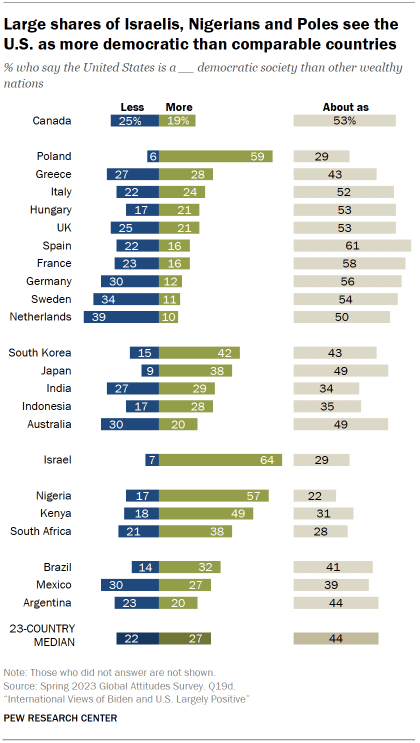
A median of 44% across the 23 nations polled believe the U.S. is about as democratic as other wealthy nations, while 27% say the U.S. is more democratic and 22% say it is less.
About half of Canadians think the U.S. is about as democratic as comparable countries. Slightly more say it is less democratic than say it is more democratic.
In Europe, Poles are particularly favorable toward the U.S. on this measure. Almost six-in-ten say the U.S. is more democratic than other affluent states, the highest share measured in the region. Elsewhere, no more than about a quarter believe the U.S. to be more democratic. And in Sweden and the Netherlands, about a third or more say the U.S. is less democratic.
Outside of Europe, assessments of U.S. democracy relative to other countries are generally positive, though Australians on balance say the U.S. is less democratic, and views in India are mixed.
About half or more in Kenya, Nigeria and Israel say the U.S. is more democratic than similar countries. And in South Africa, about four-in-ten say the same. Among those in Latin America, Brazilians are more inclined to see the U.S. as more democratic than comparable nations, while opinion is divided in Mexico and Argentina.
How religious is the U.S.?
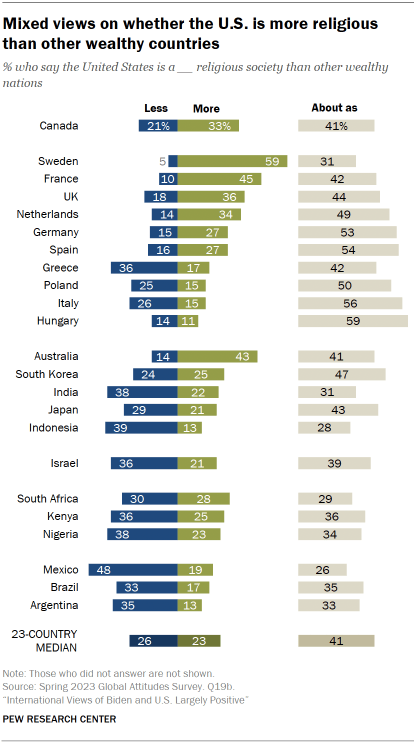
About four-in-ten of those surveyed – a median of 41% – believe the U.S. to be about as religious a place to live as other wealthy countries, while 26% say it is a less religious place, and 23% say it is a more religious place.
Notably, the U.S. generally stands out on religiosity compared with similarly advanced economies. In a recent survey, Americans have the highest share among the higher-income countries surveyed saying religion is important to them.
About a third of Canadians say the U.S. is more religious, while 21% say it is less.
Swedes are particularly prone to see the U.S. as more religious: 59% hold this view, the highest share across all countries polled. And about a third or more in France, the UK and the Netherlands see the U.S. as more religious. However, 36% of Greeks believe the U.S. is less religious than comparable countries, while just 17% say it is more religious.
Views in the Asia-Pacific region are mixed: About four-in-ten in India and Indonesia say the U.S. is less religious than other wealthy nations. However, in Australia, 43% believe the U.S. is a more religious place.
In Israel, those who think the U.S. differs from other wealthy countries are more inclined to say is it a less religious country than to say it is more religious.
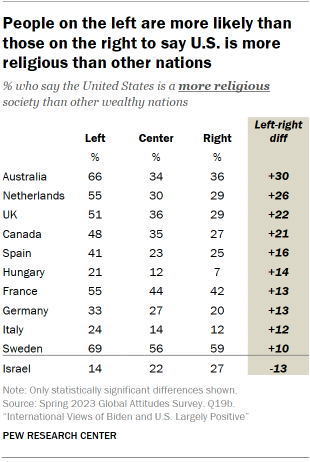
Just under a third of South Africans say the U.S. is less religious when measured against similar places, while 36% in Kenya and 38% in Nigeria say the same. Among Latin American countries, publics tend to say the U.S. is less religious.
In several countries, those who place themselves on the ideological left are more likely than those on the right to say the U.S. is a more religious place to live than other wealthy nations. In Australia, for example, 66% of those on the left hold this view, compared with only 36% of those on the right. This pattern holds across several European countries, such as the Netherlands, the UK and Spain, as well as Canada. However, in Israel, those on the right are more likely than those on the left to say the U.S. is more religious.
How tolerant is the U.S.?
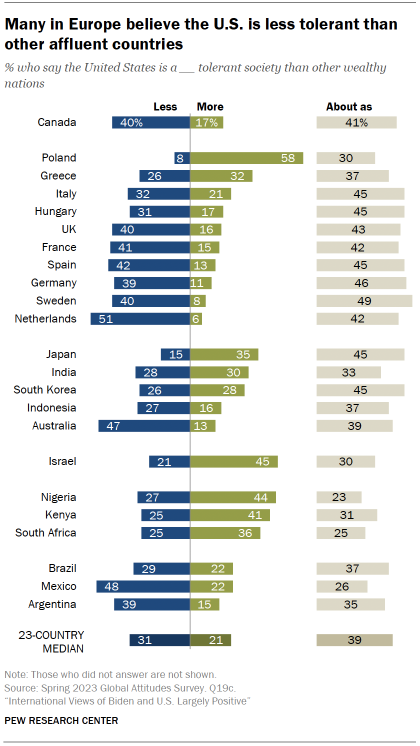
A median of 39% across 23 countries say the U.S. is about as tolerant a place to live as other wealthy nations. Those who say the U.S. differs from other wealthy nations tend to say it is a less tolerant place (a median of 31% hold this view). A median of 21% say the U.S. is a more tolerant place, with Poles especially likely to express this opinion.
In many European countries, about four-in-ten or more believe the U.S. is instead less tolerant than other prosperous countries, including 51% in the Netherlands.
Across the Asia-Pacific region, roughly a third in Japan and India say the U.S. is more tolerant, while 47% of Australians say it is less.
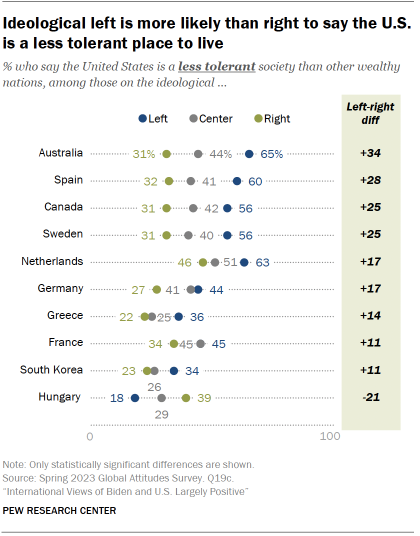
Pluralities in Nigeria, Kenya and South Africa say the U.S. is a more tolerant place to live compared with similar places, while in Latin America, public opinion leans toward the view that the U.S. is less tolerant.
In nine countries, people on the ideological left are more likely than those on the right to say the U.S. is a less tolerant place. For example, those on the left in Australia are more than twice as likely as those on the right to say the U.S. is less tolerant (65% vs. 31%, respectively). Double-digit differences are also present in Canada, most European countries surveyed and South Korea.
Ratings of American institutions, products and standard of living
We asked respondents to rate a variety of American products (such as technology, movies, music and TV) and institutions (such as the military and universities), as well as its standard of living. Generally, people consider them above average compared with other wealthy nations (in some countries, the data for this question comes from a 2021 survey – see table below).
Some countries surveyed have generally high assessments of U.S. soft power across the board. Roughly 80% or more of Israelis, Nigerians and Poles say the U.S. is the best or above average on every question asked. Ratings in Kenya and South Africa are consistently high for the different aspects of American society we measured.
On the other end of the spectrum, and despite generally positive ratings of the U.S. overall, Germans tend to have the least positive ratings of American institutions and products.
People most commonly rate American technological achievements as above average (a median of 72% across the 23 countries polled). A median of 20% say American technological achievements are average. Only 4% believe they are below average or the worst, compared with other wealthy nations.
Roughly half or more in every country, and a median of 71%, say American movies, television and music are above average. Adults under 40 are more likely than those ages 40 and older to see American entertainment as exceptional in most of the countries surveyed. Yet even among people ages 40 and older, most say American television, movies and music are above average.
Meanwhile, a median of 19% say U.S. popular culture is average and 5% say it is below average or the worst. India, home to Bollywood, stands out for having the highest share of adults who consider American movies, television and music below average or the worst (20%). The share who hold this view in most other countries is in the single digits.
A median of 69% across the 23 countries surveyed rate American universities highly. And in Kenya, South Africa, Nigeria, India, Brazil and Israel, at least half say colleges in the U.S. are the best compared with other wealthy nations.
Again, a median of 20% say colleges in the U.S. are average and 5% say they are below average or the worst compared with other wealthy nations.
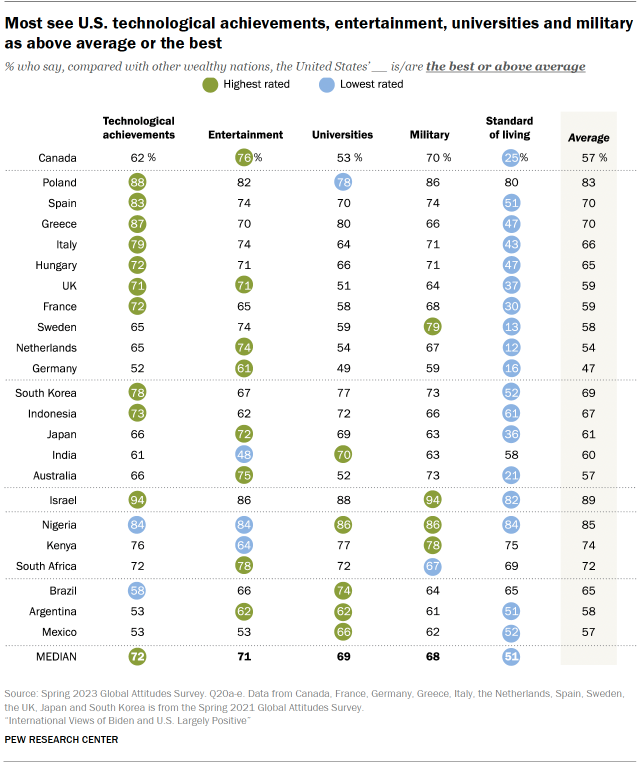
Majorities in every country surveyed, with a median of 68%, rate the U.S. military as above average or the best. People in Israel, Sweden, Nigeria and Kenya are especially likely to rate the U.S. military highly, compared with other aspects of American society. A large majority of Poles agree, though the military falls just below ratings of American technology in Poland. Very few rate the U.S. military as average (a median of 18%) or below average (a median of 6%) across the countries surveyed.
Compared with American institutions and products, fewer say the standard of living in the U.S. is better than average. Just around half hold this view across the countries surveyed. And in nearly every country, the U.S. standard of living receives lower ratings than the other four aspects of America’s image we asked about.
There is some variability in responses to this question, though. In Nigeria, Israel, Poland and Kenya, 75% or more say the standard of living in the U.S. is above average or the best when compared with other wealthy nations. Yet around 20% or less agree in Australia, Germany, Sweden and the Netherlands.
Across all 23 countries surveyed, a median of 35% say the standard of living in the U.S. is average and 13% say it is below average or the worst.
5. Perceptions of global economic power
Across the 23 countries surveyed, a median of 41% say the U.S. is the world’s leading economic power as opposed to China, Japan or countries in the EU. This view is especially common in South Korea, Japan, Israel, Poland, India, Hungary and Sweden, where half or more name the U.S. as the top economy.
A median of 33% believe China is the leading global economic power. Italy is the only nation in the study where a majority expresses this view, although half of Australians and 48% in Greece and Spain agree.
The share who say the U.S. is the world’s top economy has grown 17 percentage points in Germany since this question was last asked in 2020. Double-digit increases were also observed in Sweden and Japan, with smaller increases in France, Canada, the Netherlands and South Korea. Among countries where this question was last asked in 2019, double-digit increases are observed in Indonesia, Hungary and Poland.
However, there is agreement that the U.S. and China are the two global economic powers. Either the U.S. or China were the top choice in all countries surveyed as opposed to Japan or the EU.
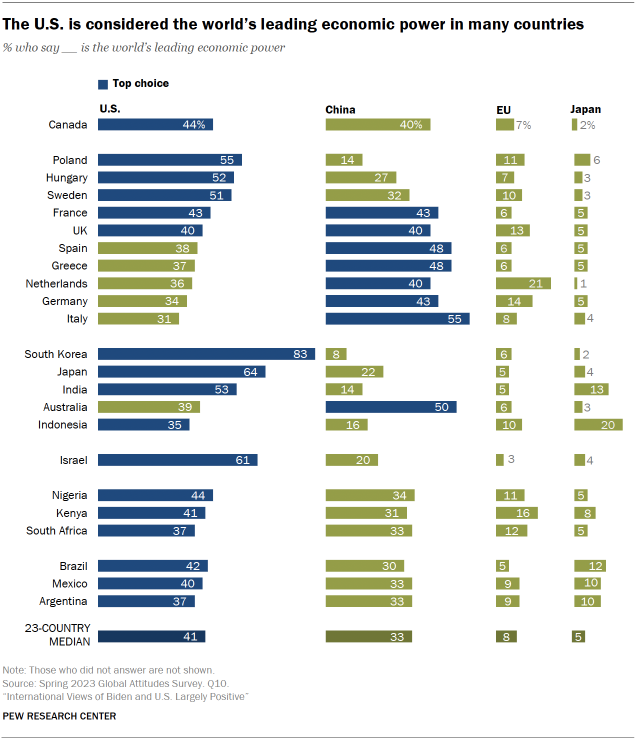
Middle-income countries largely see benefits to U.S. investment, except Argentina
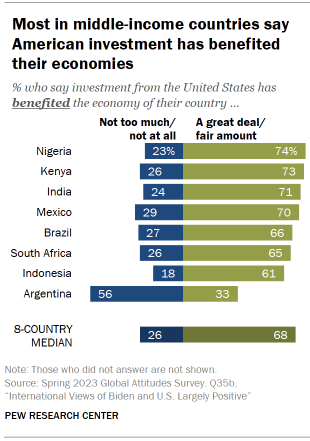
Out of the eight middle-income countries in the survey, as designated by the World Bank, majorities in seven say their economies have benefited from U.S. investment. Seven-in-ten or more in Nigeria, Kenya, India and Mexico see American investment as a net positive for their domestic economies. Kenyans (45%) and Nigerians (43%) are the most likely to say their economy has benefited a great deal.
Argentina, on the other hand, is the only nation where a majority of respondents believe American investment has not been good for their country.
Acknowledgments
This report is a collaborative effort based on the input and analysis of the following individuals.
Richard Wike, Director, Global Attitudes Research
Janell Fetterolf, Senior Researcher
Moira Fagan, Research Associate
Sarah Austin, Research Assistant
Jordan Lippert, Research Assistant
Dorene Asare-Marfo, Panel Manager
Peter Bell, Design Director
Janakee Chavda, Assistant Digital Producer
Laura Clancy, Research Assistant
Sneha Gubbala, Research Assistant
Christine Huang, Research Analyst
Hannah Klein, Communications Manager
Gar Meng Leong, Communications Associate
Clark Letterman, Senior Survey Manager
Carolyn Lau, International Research Methodologist
John Carlo Mandapat, Information Graphics Designer
Gracie Martinez, Senior Administrative Coordinator
Patrick Moynihan, Associate Director, International Research Methods
Reem Nadeem, Associate Digital Producer
Jacob Poushter, Associate Director, Global Attitudes Research
Laura Silver, Associate Director, Global Attitudes Research
Sofi Sinozich, International Research Methodologist
Methodology
About Pew Research Center’s Spring 2023 Global Attitudes Survey
Results for the survey are based on telephone, face-to-face and online interviews conducted under the direction of Gallup, Kantar Public, Langer Research Associates and Social Research Centre. The results are based on national samples, unless otherwise noted. More details about our international survey methodology and country-specific sample designs are available here. Results for the U.S. survey are based on data from the American Trends Panel.




